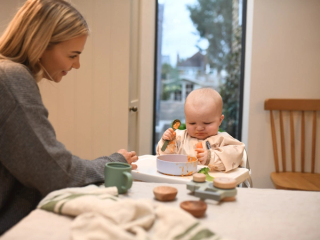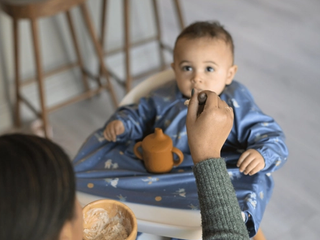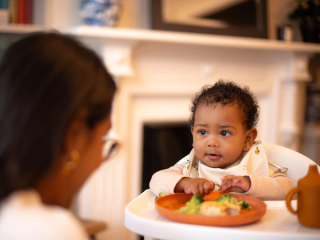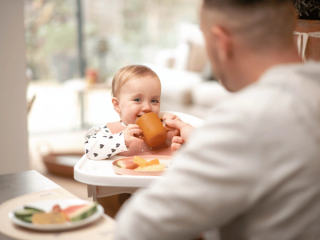
- Home
- Advice Hub
- Baby
- Weaning
- Baby's Breakfast - Food Groups And Portions
Baby's Breakfast - Food groups and portions
Hear from our resident nutritionist how to keep up a health balanced diet for your little one's most important meal of the day!
Ever heard the saying ‘breakfast is the most important meal of the day’, and wondered why this is the case?
After a full night’s sleep (if you’re lucky enough for your little one to be sleeping through), or even a broken one, it’s important for babies to re-fuel with a healthy, balanced breakfast. Not only will sitting down to a good breakfast help to start the day off with some important nutrients, it will also help get your baby into a routine of having three regular meals a day, with healthy snacks/baby’s usual milk in-between (depending on their age).
Toddlers and young children, (from the age of 1 year) need a diet made up of four main food groups:
- Starchy foods (5 portions a day)
- Fruit and vegetables (at least 5 portions a day)
- Dairy foods (3 portions a day of whole fat dairy foods for those under 2 years)
- Protein foods (2 portions a day, or 3 portions for vegetarians)
So, what makes up a healthy, balanced breakfast?
All meals should be based on starchy foods, which for breakfast means things like fortified breakfast cereals, bread, oats, grains, and other cereals.
For the first 12 months of your baby’s life, choose starchy foods that are lower in fibre. While they are growing and developing at a rapid speed, babies need a high energy and fat diet in relation to their body size. Too much fibre could fill them up before they have consumed high enough levels of energy and nutrients.
Starchy foods provide energy, while fortified breakfast cereals, like our new Hipp porridge range provide iron, vitamin D, as well as other key vitamins and minerals to support your baby’s growing nutritional needs.
Iron
Babies are born with a store of iron that starts to run out by the time they reach 6 months old, so it’s important to give them iron-rich foods from this age. Iron supports normal cognitive development in children – and at this stage that means things like learning the process of memory, language, thinking, and reasoning.
Vitamin D
Most people know that our main source of vitamin D is from the sun – but it’s important to protect babies’ sensitive skin. So, how do we ensure they get the Vitamin D they need for the normal growth and development of bones, and to build normal immunity?
Vitamin D is only found in a few foods such as oily fish and eggs. The difficulty of consuming adequate vitamin D from food sources alone is why the Department of Health and Social care recommends vitamin D supplements:
- Breastfed babies from birth to 1 year of age should be given a daily supplement containing 8.5 to 10 micrograms
- Formula fed babies drinking more than 500ml don’t need additional vitamin D supplementation, as formula milk is already supplemented
- Babies from 1-4 years of age should be given a daily supplement containing 10 micrograms
Including fruit and vegetables at breakfast
It’s not all about starch though; breakfast should also include at least one portion of texture-appropriate fruit and vegetables to help you meet the requirement for five portions of fruit and vegetables throughout the day. (A toddler’s portion is around a 40g serving, which is half of that of an adult portion).
If serving porridge or cereal to your baby for breakfast, you could mix in some fruit puree or mashed/chopped fruit, or serve it with fruit fingers (depending on age and weaning stage). If you’re serving toast, try a no-added salt smashed avocado recipe topping. For older babies, try making porridge fingers with chopped blueberries.
Full-fat dairy
If your baby is older and less reliant on milk feeds through the day, serving a dairy portion at breakfast will help to meet their requirement for three portions of dairy foods a day. Dairy foods include milk, cheese and yoghurt. Choose full fat, no added sugar varieties to provide important nutrients like calcium, which (alongside Vitamin D) is also for the normal growth and development of children’s bones.
And what about the protein?
Two to three portions of protein are recommended throughout the day, depending on whether your baby is vegetarian. This includes foods like meat, fish, eggs, beans and pulses, and nuts (which should be served crushed/ground/in a nut-butter until the age of 5 years old).
Protein is needed for the normal growth and development of bone in children, and in addition protein foods can provide other vitamins and minerals like iron and zinc to baby’s diet.
Three ideas for a balanced baby breakfast
- Berry and nut butter porridge
- Nut butter on toast, served with banana fingers
- Eggy bread with chopped spinach and cheese
Remember that children’s food preferences and appetites can vary from day to day, so try not to worry if they eat more in one meal than another, or from one day to the next. They are usually good at regulating their appetites. If you have any concerns, however, contact your healthcare professional for advice.
Advice & tips

Want to read more? Join the HiPP BabyClub for full access to this article.
As a BabyClub member, you'll get access to a range of exclusive benefits, including:
Monthly competitions
Discounts from our Partners
Expert advice tailored to your little one's age
Weaning recipes
HiPP shop discounts*
*10% off HiPP's online shop does not apply to our First Infant, Anti-Reflux or Comfort Formula Milk.
Important notice: Breastfeeding is best. Follow on milk should only be used as part of a mixed diet from 6 months. Talk to a healthcare professional.
















